Jerusalem, MINA – The Israeli occupation’s systematic unjust decisions of Immediate demolition threatens the homes of more than 100 Palestinian families in occupied Jerusalem, in which the (Israeli) Jerusalem municipality rejects the building plans submitted to it by the Palestinians who try to prevent the demolition of their homes by the Israeli occupation.
The Hebrew newspaper, Haaretz, reported on Tuesday, that the occupation municipality in Jerusalem refuses to draw up structural maps to organize construction in occupied Jerusalem, as the city’s central court judge, Rivka Friedman-Feldman, issued a decision in which she said, “in the absence of progress of serious plans, there is no pretext for extending demolition orders – for Palestinians.”
The judge justified her rejection of an appeal filed by 58 Palestinian families against the demolition of their homes in the Silwan neighborhood, adjacent to the Old City.
The newspaper pointed out that there are 20,000 homes in Jerusalem that were built without building permits from the occupation authorities due to their policy in Jerusalem, to refrain from drawing up structural plans that allow building permits for Palestinian residents.
Also Read: Palestinian Killed by Israeli Drone Strikes as Ceasefire Violations Continue in Gaza
The last approval of a structural plan in Silwan was in 1977, and it was related to a public area, and not to building civil houses.
For the past 15 years, the residents of Silwan have tried to submit structural plans to the Israeli municipality in Jerusalem to change the purpose of the land to allow construction, while incurring huge financial losses.
Two months ago, the Israeli Court of Local Affairs rejected the residents’ request to delay the implementation of demolition orders of their own houses .
Judge Friedman-Feldman’s decision means that the municipality can implement demolition orders in Silwan with immediate effect.
Also Read: Hamas Announces Continued Search for Israeli Captives’ Bodies Despite Difficulties
About a month ago, the District Court Judge for Local Affairs, Yael Entebbe-Sharon, rejected a request to postpone the demolition of another building in Silwan, where a clinic is located and serves 5,500 Jerusalemites, and it is the only clinic that provided services during the coronavirus pandemic.
There is also a dental clinic in the building, in addition to four apartments housing 30 people, most of whom are children.
As part of the policy of abuse practiced by the Israeli judiciary, Judge Friedman-Feldman agreed to the appeal of the owners of this building to postpone the demolition of the building, on the condition that they deposit 50,000 shekels in the court treasury.
Recently, negotiations have increased between the Jerusalem municipality of the occupation and dozens of Palestinian families in the Al-Bustan neighborhood in Silwan, which the municipality is seeking to demolish, claiming that construction in it is not licensed.
Also Read: Israeli Defense Ministry-Linked Group Facilitating Controversial Gaza Evacuation Flights
The municipality decided to demolish this neighborhood in favor of establishing a settlement project in the form of an “archaeological-tourist park” called “King’s Garden”, which is part of the “City of David National Park” managed by the “Elad” settler association, which works to Judaize the Old City of Jerusalem and its surroundings.
In order to prevent arbitrary demolition, the Palestinian residents negotiated with the municipality, and submitted a structural map of the neighborhood to the municipality, which included the demolition of the neighborhood and the rebuilding of 60% of its area, while the rest of the space is allocated to the settlement park.
However, the municipality recently rejected the residents’ plan, and suggested moving the residents to a small number of buildings in 5% of the neighborhood area.
The Jerusalem District Court postponed the demolition of a building inhabited by 10 families in the Al-Tur neighborhood, in order to allow the residents to demolish their homes themselves.
Also Read: WHO Reports Over 900 Gazans Died Awaiting Medical Evacuation
Currently, the Israeli Supreme Court is considering a petition submitted by 38 families from the village of Al Walaja, in the south of occupied Jerusalem, after demolition orders were issued against their homes.
The families filed a petition against the District Planning and Building Committee of the Israeli occupation Ministry of the Interior, following its refusal over the years to consider a structural plan for the construction submitted by the residents of the village.After the court obligated the committee to consider the structural map, the committee rejected it.
The Israeli authorities had confiscated half of the village of Al Walaja and annexed it to the Jerusalem municipality’s jurisdiction, after occupying it in 1967, and rejected drawing up a structural map. Thus, any construction in the confiscated area is considered illegal. (L-K-G/RE1)
Mi’raj News Agency (MINA)
Also Read: Gaza Medical Team Identifies 97 of 330 Bodies Returned by Israel










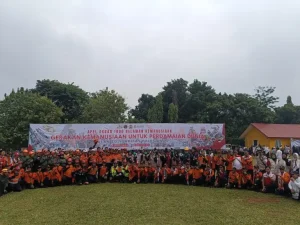





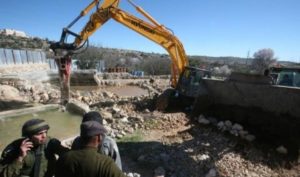
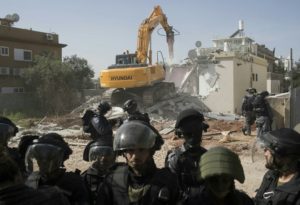
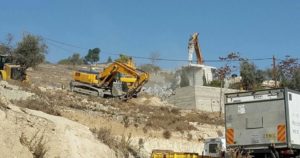
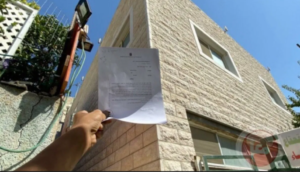

















 Mina Indonesia
Mina Indonesia Mina Arabic
Mina Arabic